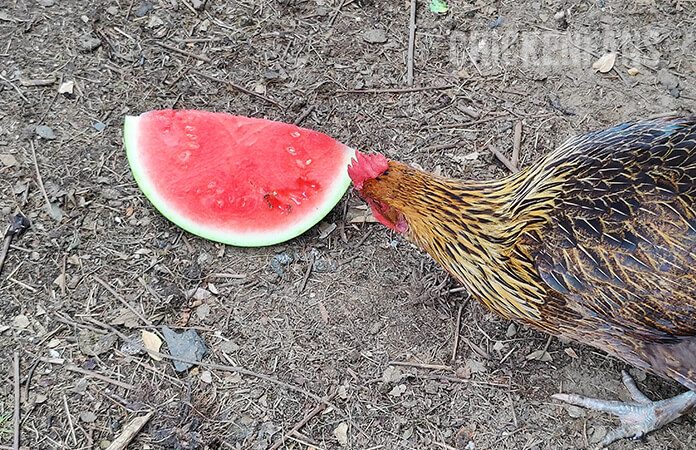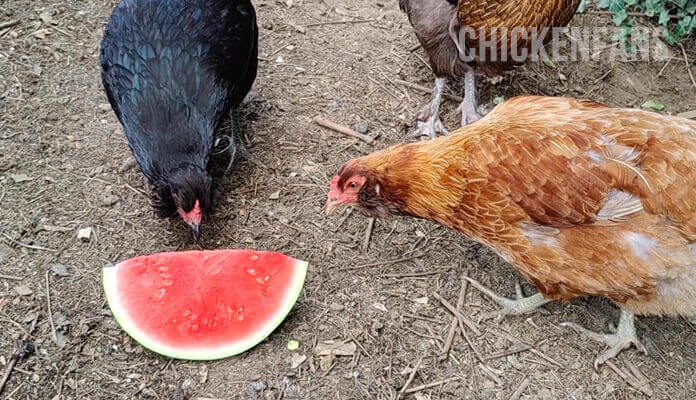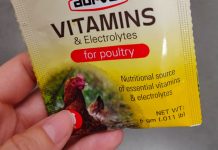Can Chickens Eat Watermelon? (Flesh, Rind, Seeds)

Watermelon is a popular treat for chickens when it’s hot in summer. It allows chickens to cool down and stay hydrated.
- Can Chickens Eat Watermelon?
- Nutritional Value of Watermelon for Chickens
- Health Benefits of Watermelon for Chickens
- Risks of Overfeeding Watermelon for Chickens
- How much watermelon can chickens eat?
- Can Chickens eat Watermelon Rind?
- Can Chickens eat Watermelon Seeds?
- Can baby chicks eat watermelon?
Main takeaways:
- Chickens can eat fresh watermelon and rind in moderation
- The seeds are the most nutritional
- Watermelon is high in sugar, so consider it a treat
Can Chickens Eat Watermelon?
Adult chickens can eat roughly 100 grams of watermelon flesh, rind, and seeds as a treat. It contains antioxidants, vitamin C, and lycopene, keeps them hydrated, and allows them to cool down. Unfortunately, it’s also high in sugar. Baby chicks should not eat watermelon.
Nutritional Value of Watermelon for Chickens
As the name suggests, watermelons are 91% water. Most of the calories come from the sugar of the sweet melon.
| Watermelon (100g) | Amount | % DV Laying Hen |
|---|---|---|
| Calories | 30 kcal | ~10% |
| Water | 91.4 g | – |
| Protein | 0.61 g | ~3% |
| Carbs | 7.55 g | – |
| Sugar | 6 g | ~20% |
| Vitamin A, RAE | 28 µg | ~3% |
| Vitamin C | 8.1 mg | ~8% |
| Lycopene | 4530 µg | – |
| Potassium | 112 mg | – |
| Magnesium | 10 mg | ~ |
| Calcium | 7 mg | ~0,2% |
They do come with a couple of healthy micronutrients:
- Vitamin C – an antioxidant, vital for tissue growth and blood vessels and involved in many body functions and proper functioning of the immune system
- Lycopene – an antioxidant that reduces oxidative stress, heart diseases, and cancer. Watermelons are rich in lycopene. There are no daily value requirements specified for chickens (nor for humans)
Watermelon also comes with traces of other vitamins and minerals. Apart from the high sugar levels, they are healthy overall.
Health Benefits of Watermelon for Chickens
Treating the flock with an occasional watermelon comes with some health benefits:
- It keeps the chickens hydrated: chickens need water to regulate their body temperature; water also plays a vital role in the digestion and the organ functions
- It helps them regulate their body temperature: the water, minerals, and electrolytes in watermelon allow them to cool down from heat stress
- May have anticancer effects: lycopene combats excessive cell growth in certain forms of cancer
- Boosts the immune system: the antioxidants, lycopene, and vitamin C reduce oxidative stress and inflammation that are linked to several diseases
- Improves heart and blood health: some studies indicate lycopene may help in the prevention of heart diseases and lower cholesterol and blood pressure
Most of the health benefits for chickens can be attributed to vitamin C and lycopene. Although watermelons are no superfood, they can be a refreshing treat for your flock in the summer.
Risks of Overfeeding Watermelon for Chickens
The main problem with sweet watermelons is that they have such a high sugar concentration. The sugar in watermelons consists of sucrose, glucose, and fructose. All those sugars have a high glycemic index and spike the chicken’s blood sugar levels.
Backyard chickens can’t handle high sugar levels well. They are naturally insulin-resistant, like diabetics. Their body cells don’t pull the excess sugar out of the bloodstream.
The insulin resistance in chickens varies per breed. Silkies have a stronger ability to regulate glucose than broiler chickens.
Risk of sugars in watermelons
Overfeeding chickens with sugars from watermelon can cause:
- Sour Crop: the high sugar concentrations increase the risk of Candida infections. Chickens store food in their crop when they eat. High sugar concentrations speed up the fermentation process and boost yeast growth.
- Hyperglycemia: a condition where blood sugar levels are high. Hyperglycemia causes high blood pressure, inflammation, weight gain, diabetes, liver problems, and many other diseases.
How much watermelon can chickens eat?
Due to the high sugar levels, you can’t just go willy-nilly and throw some watermelons in the run. Fruit is a treat, and moderation is key. Watermelons also don’t bring any proteins or fats to the table.

Treats should never take more than 10% of a chicken’s daily feed intake. That rule of thumb says you can only feed chickens 50 to 100 grams of watermelon daily. The interpretation depends on whether you take 10% of the calories, weight, or sugar concentration.
Your chickens won’t die if they eat some more sugar once. But if it becomes a regular thing, you should be aware of the risks involved. And they might eat less regular food as they will prefer sweet watermelon.
Can Chickens eat Watermelon Rind?
Chickens can and will eat watermelon rind. The green-to-yellowish outer layer of the watermelon contains less sugar than the flesh but still has many of the same micronutrients.
So instead of tossing the rinds in the garbage, it’s perfectly possible to give them to your chickens. You could also mix them with some refreshing water in the summer.
Can Chickens eat Watermelon Seeds?
Chickens can eat watermelon seeds. They are much healthier than the flesh and rich in fiber and essential minerals. They have high antioxidant activity and come with several health benefits.
The seeds annoy us, and we tend to spit them out. Dog can’t even be fed watermelon seeds.
But chickens love the seeds, and the black and white seeds spike their interest. The birds have a digestive system that’s fully prepared to digest the nutritional seeds.
Can baby chicks eat watermelon?
We do not recommend feeding watermelon to baby chicks. The high sugar content and the large seeds can challenge their digestive system and crop.
Other Reads
Other fruits:
- Can chickens eat grapes – discusses grapes, their sugar and alcohol content
- Can chickens eat mango – discusses another sweet fruit
Some frequently asked questions:
- Can chickens eat and taste spicy food – here, we discuss the taste of chickens
- Can chickens eat onions – the risks of feeding onions and their use as poultry supplements
- Can chickens eat chocolate – several variants of chocolate are toxic to chickens
Some articles we mentioned here:
- The chicken digestive system – how chickens digest their food
- The chicken respiratory system – how chickens breathe and why it’s so different from how we breath
If you want to learn more about chicken feed, please consult our ‘Chicken Food Page‘ to go and see every specific food article we address, including all articles on what chickens can and can not eat. Or go to our listicle food summary on ‘The Classroom‘.























